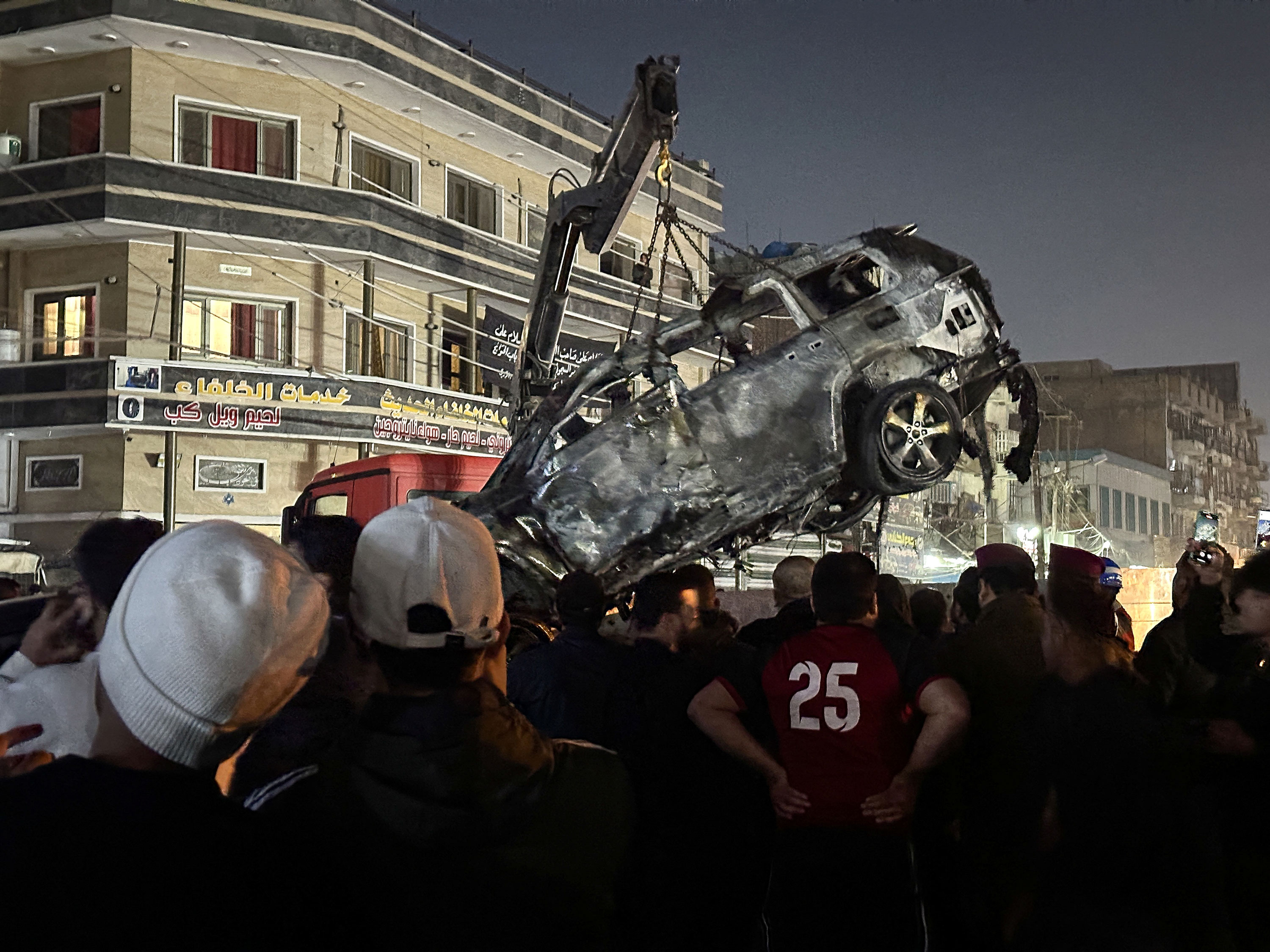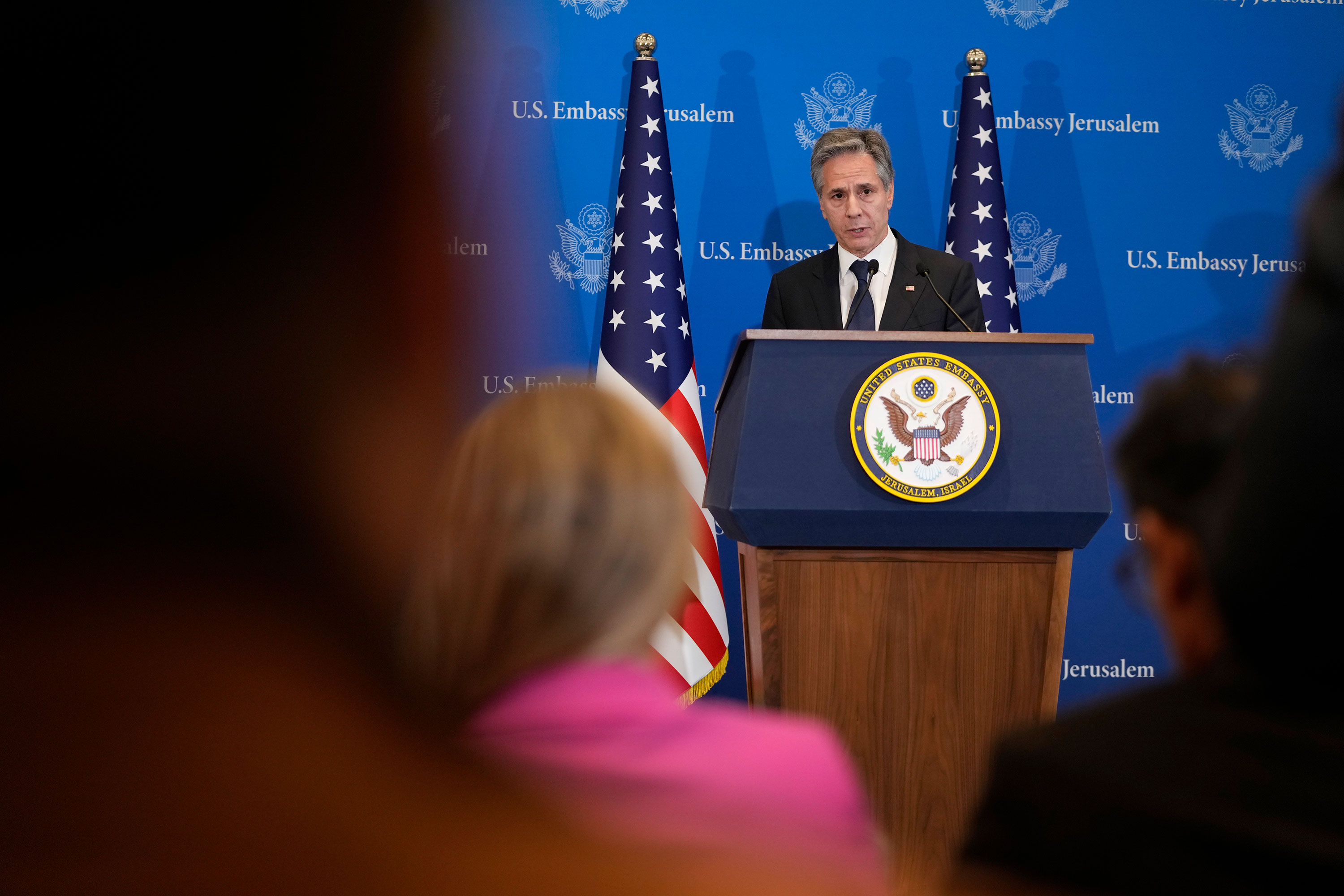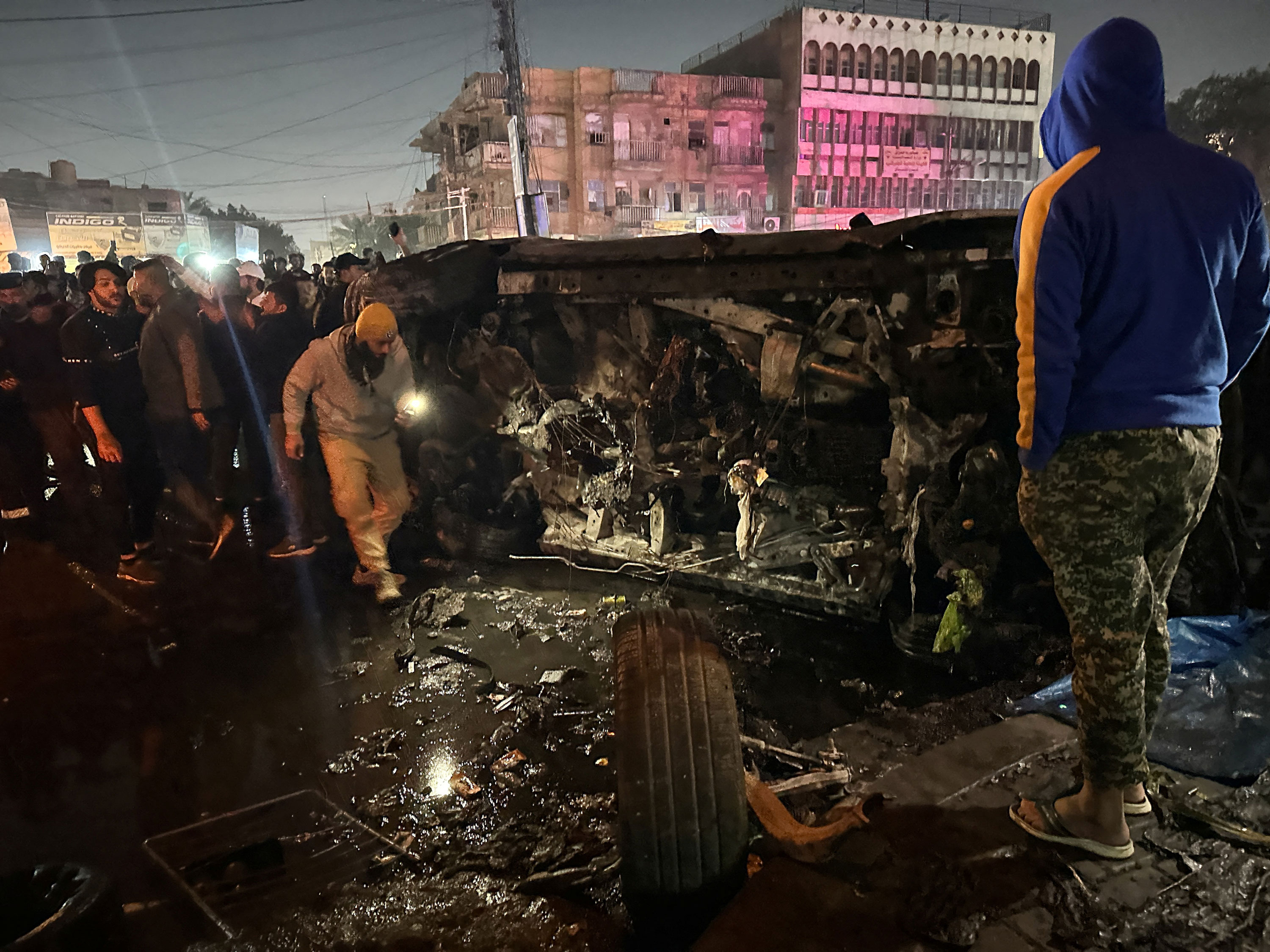Our live coverage of the conflict in the Middle East has moved here.
February 7, 2024 Israel-Hamas war
By Helen Regan, Sophie Tanno, Amir Vera, Aditi Sangal, Leinz Vales, Adrienne Vogt, Maureen Chowdhury and Tori B. Powell, CNN
Netanyahu dismisses Hamas proposal, but Blinken says it leaves room for a potential deal. Here's the latest
From CNN staff
US Secretary of State Antony Blinken said Wednesday that Hamas' counterproposal for a Gaza ceasefire and hostage deal leaves room for a potential agreement.
“While there are some clear nonstarters in Hamas’ response, we do think it creates space for agreement to be reached, and we will work at that relentlessly until we get there,” he said at a news conference in Tel Aviv, Israel.
Blinken said he discussed the proposal with Israeli government officials.
Prime Minister Benjamin Netanyahu had earlier dismissed Hamas’ proposals, calling them “delusional.” However, the Israeli leader did not rule out the possibility of further negotiations.
Blinken also discussed the latest developments in Gaza with Palestinian Authority President Mahmoud Abbas in Ramallah.
Here are the latest developments:
- US raises concern over Israel's operations in Rafah: Blinken raised concerns about a potential expansion of Israeli military operations into Gaza’s southern city of Rafah during meetings with Netanyahu and other top Israeli officials, two Israeli officials told CNN. Meanwhile, UN Secretary-General António Guterres expressed concerns over the escalating humanitarian crisis in Rafah, saying an extension of Israeli operations there would have "disastrous" repercussions.
- No plan in place for Rafah: The top commander in charge of Israel’s operation in southern Gaza said that there is no plan in place yet for how to minimize civilian deaths in Rafah, as fears mount that an Israeli offensive in what is now the enclave’s most populous city could result in mass casualties.
- Hamas delegation will travel to Cairo: Hamas will send a delegation to Cairo Thursday to follow up on the counterproposal it offered, the group's spokesperson Osama Hamdan said in Beirut. He described the Hamas counterproposal as a "positive response" that "guarantees reconstruction, lifting the siege, and releasing prisoners."
- Israel-based human rights organizations call for ceasefire: A statement published jointly by 17 Israeli based groups, including B’Tselem, Combatants for Peace, and Breaking the Silence, called for an immediate ceasefire in Gaza. The organizations said that 120 days of war have caused "unfathomable death and destruction," decimated health care systems, created a lack of food supply and clean drinking water and displaced civilians in Gaza. It called on the involved parties to "reach an immediate ceasefire."
- US targets Kataib Hezbollah commander: A US military strike in Baghdad killed a Kataib Hezbollah commander who was responsible for attacks on American forces in the region, according to US Central Command. The attack was carried out by a drone, according to US and Iraqi officials.
- Iran denial: Iran's ambassador to the United Nations Amir Saeid Iravani denied that Iran is supplying arms to Houthi rebels during an interview with NBC's Lester Holt on Wednesday. When Holt asked, "In the Houthi attacks that we have seen on commercial shipping, there are sophisticated weapons. Is Iran supplying those weapons?" Ambassador Iravani said, "Not at all."
Iraq was not notified of Baghdad strike on Kataib Hezbollah commander until shortly after, US official says
From CNN's Haley Britzky

Iraq was not notified of the US military’s strike on a Kataib Hezbollah commander in Baghdad until shortly after it occurred, a US official said Wednesday.
“We were clear in public statements and in private conversations with the Iraqis that the United States would respond to the attack a time and place of its choosing,” the official said, referencing the deadly drone attack in Jordan that killed three US soldiers.
The official said a notification of the strike prior would not have been provided out of operational security concerns.
The official added the strike was in planning “from the moment the president directed the military to review options” following the Jordan attack.
Iraq issues warning to US after drone strike kills militia commander in Baghdad
From CNN's Mohammed Tawfeeq in Baghdad
Iraq has issued a warning to the United States in response to an airstrike late Wednesday in Baghdad that killed a senior commander with the pro-Iran Kataib Hezbollah militia.
Iraq's Joint Operation Command called the strike a "new aggression by the United States, adding that the move acted to "undermine all understandings" between Iraq and the US, in a statement posted by spokesperson Tahseen Al Khafaji on X.
The spokesperson also reiterated what the country said after the first series of US strikes in Iraq last Friday in retaliation for the killing of three US soldiers in Jordan, which was to call the strikes a "violation of Iraqi sovereignty."
Kataib Hezbollah is considered the most powerful Iran-backed militia in Iraq and part of a state-sponsored consortium of militias in the country known as the PMU (Popular Mobilization Forces), many of them Shia militias, that help maintain security there.
But just days after the killing of the three US soldiers in Jordan on January 28, Kataib Hezbollah announced it was suspending its military operations against US forces, which was seen as signs the group feared blowback by the US on itself, as well as other pro-Iran militias or even Iran proper in response to the US solider deaths.
US targeted Wisam Mohammed Saber al-Saedi in Baghdad strike, three US officials say
From CNN's Oren Liebermann and Mohammed Tawfeeq
The US targeted Wisam Mohammed Saber al-Saedi in the Baghdad strike Wednesday, according to three US officials.
The Kataib Hezbollah commander was in charge of logistical support including drone and rocket operations for the organization, a source within the Iran-backed Popular Mobilization Units told CNN.
US Central Command said it targeted a commander of Kataib Hezbollah who it is said was responsible for attacks on American forces in the region.
Kataib Hezbollah released a statement mourning al-Saedi early Thursday morning (Baghdad time.) The militant group said al-Saedi’s death “calls us to remain steadfast in the jihadist approach.”
Last week, Kataib Hezbollah said it was ceasing attacks and operations against US forces in the region so as not to embarrass the Iraqi government.
Kataib Hezbollah is part of the Islamic Resistance in Iraq and the Popular Mobilization Units, which fall under the Iraqi military forces. The US blamed the Islamic Resistance in Iraq for a drone strike on January 28 that killed 3 US service members and wounded dozens more.
The post was updated with information about al-Saedi from a source in the PMU.
Blinken says Israel must not “lose sight of our common humanity"
From CNN's Michael Conte and Jennifer Hansler

US Secretary of State Antony Blinken said Israel must not “lose sight of our common humanity," as Prime Minister Benjamin Netanyahu said Israel’s war in Gaza will continue.
“The overwhelming majority of people in Gaza had nothing to do with the attacks of October 7th,” Blinken said at a news conference in Tel Aviv. “And the families in Gaza whose survival depends on deliveries of aid from Israel are just like our families.”
For days, Israeli protesters have blocked trucks carrying aid for Gaza, demanding that humanitarian assistance only be delivered in exchange for the release of the hostages. Officials with aid agencies have said Israel’s ongoing military campaign amounts to collective punishment.
Blinken said Israelis were “dehumanized in the most horrific way on October 7,” referring to the Hamas assault that left at least 1,200 people dead, and that “the hostages have been dehumanized every day since,” but that “that cannot be a license to dehumanize others.”
His comments come as US President Joe Biden's administration faces backlash and anger at home over its continued support of the offensive — a backlash that threatens to have political consequences for the president.
Wednesday's strike in Iraq is not the last of Biden's authorized actions, administration official says
From CNN's MJ Lee
The US military strike that Central Command said killed a Kataib Hezbollah commander in Iraq on Wednesday does not mark the end of a series of retaliatory actions that President Joe Biden authorized early last week.
According to an administration official, there's more to come in response to the deaths of three US soldiers in Jordan.
A White House official said the execution of the strike itself and its timing were carefully considered to avoid any loss of innocent life – and that the US military moved to go after this commander as soon as the opportunity presented itself. Central Command said there were no indications of civilian casualty collateral damage.
This official also reiterated what Biden said since the US retaliatory strikes began last week: “We will not hesitate to defend our people and hold responsible any and all who seek to harm Americans.”
US says its drone killed a Kataib Hezbollah commander in Iraq responsible for attacks on American forces
From CNN's Natasha Bertrand, Oren Liebermann, Mohammed Tawfeeq and Haley Britzky

A US military strike killed a Kataib Hezbollah commander in Iraq on Wednesday night who was responsible for attacks on US forces in the region, according to US Central Command.
The attack was carried out by a drone against a vehicle in Baghdad, according to US and Iraqi officials. There are no indications of collateral damage or civilian casualties, Central Command said in its statement.
Iraqi police said there was at least one other person inside the vehicle who has not been identified.
“We will not hesitate to hold responsible all those who threaten our forces’ safety,” Central Command said.
The identity of the commander has not yet been released. Local police officials in Baghdad said on Wednesday that the strike hit an SUV in the Al-Mashtal, a predominantly Shia neighborhood in eastern Baghdad.
The strike came as the US has been planning retaliatory attacks against Iran-backed militants who launched a drone at a US outpost in Jordan last month that killed 3 American soldiers.
The US has blamed that attack on an umbrella group of Iran-backed militias called the Islamic Resistance in Iraq.
A CNN team on the ground in Baghdad heard at least two loud explosions in quick succession around 9:30 p.m. local time.
The two people who were inside the vehicle have not been identified because the bodies were completely charred from a fire that erupted from the strike, the police said.
But a senior local security source and a senior source with the Iraqi Popular Mobilization Units (PMU) told CNN that a senior leader with the Iran-backed Kataib Hezbollah militia was killed in the attack.
The US conducted airstrikes in Iraq and Syria last week targeting seven facilities used by Iran’s Islamic Revolutionary Guard Corps and affiliated militias in retaliation for the deadly drone attack in Jordan.
"There won’t be any hostages to release" if Israel maintains plan to eliminate Hamas, former hostage says
From CNN's Amy Cassidy in London and Lauren Izso in Tel Aviv
Former Israeli hostage Adina Moshe on Wednesday criticized Israeli Prime Minister Benjamin Netanyahu, saying that "there won’t be any hostages to release" if his government continues its plan to eliminate Hamas.
Moshe, 72, who was kidnapped by Hamas from Kibbutz Nir Oz and held hostage in Gaza for seven weeks, spoke at a news conference for the Hostages and Missing Families Forum — directing her comments specifically to Netanyahu.
“Mr. Netanyahu, I’m turning to you. It’s all in your hands. You are the one. You’re the one who can. And I’m really afraid that if you continue the way you do, the destruction of Hamas, there won’t be any hostages to release," Moshe said.
The Hostages and Missing Families Forum Headquarters also delivered a message to Netanyahu and the Israeli War Cabinet in a release on Wednesday.
"If the hostages are not returned home: the citizens of Israel should know they live in a state that is not committed to their security, that the mutual responsibility in it has died," the families forum said in the release. "They who do not protect their citizens will find that their citizens lose faith in them and their leadership."
Earlier Wednesday, Netanyahu reiterated that Hamas must be destroyed for Israel to be safe. He dismissed Hamas’ proposals for a ceasefire and hostage deal, calling them “delusional.” However, the Israeli leader did not rule out the possibility of further negotiations.


